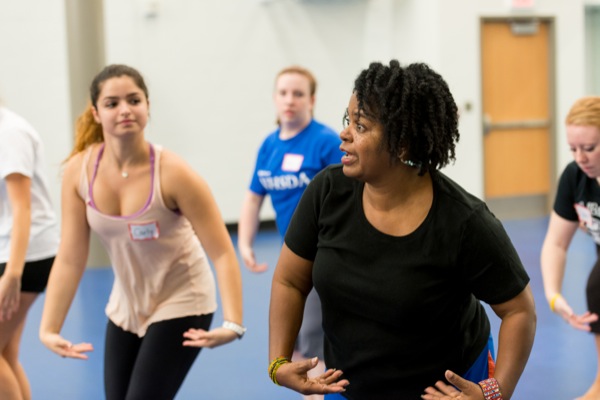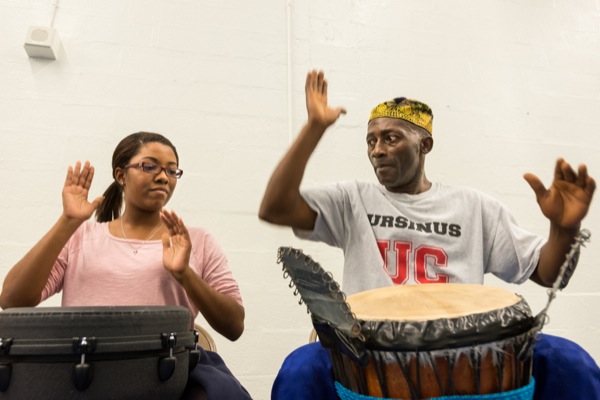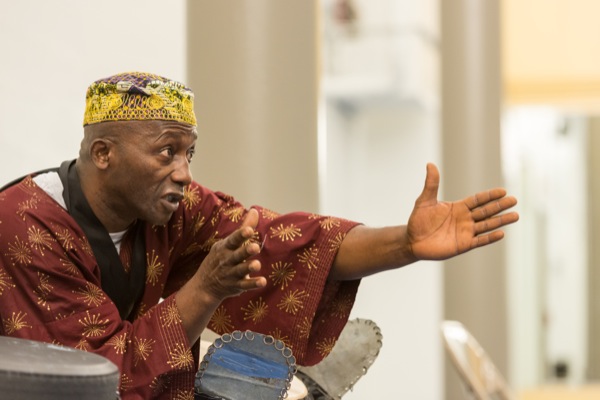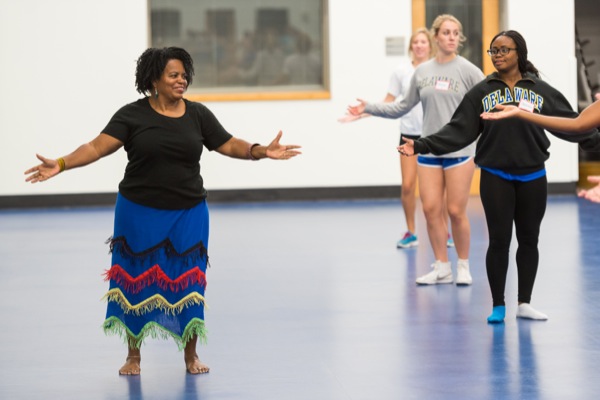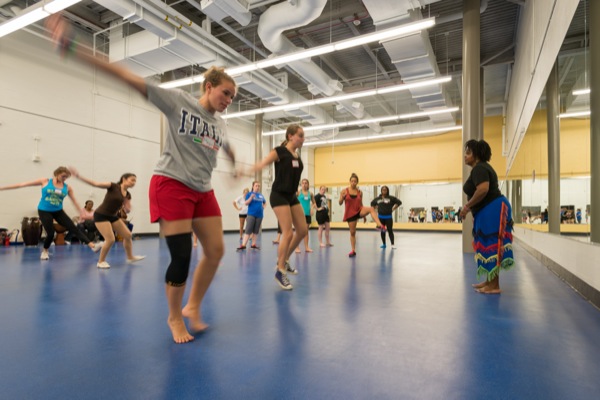Harvest rhythm
Professional African dance and music duo teaches UD students
2:24 p.m., Oct. 29, 2013--They stomped. They clapped. They sowed their seeds and pulled in the harvest, all the while chanting and singing and playing drums like nobody’s business.
The students from the University of Delaware’s dance minor and the Department of Music were rehearsing a traditional African dance and musical piece they will soon perform on stage.
People Stories
'Resilience Engineering'
Reviresco June run
But rather than learn from their usual instructors, the dancers and percussionists were receiving instruction from an artist-in-residence duo from Massachusetts, Marilyn and Sekou Sylla.
“Move around, really engage your audience,” Marilyn directed the students. “Don’t just go around in a circle clapping and stomping rhythmically.”
As part of the President’s Diversity Initiative, the Syllas were able to visit the UD campus for several days in mid-October, working with dance students and three students belonging to assistant professor of percussion Harvey Price.
Back in Massachusetts, the Syllas work as part of the Five College Consortium, which includes Smith College, where Marilyn is based, and Mount Holyoke College, where Sekou calls home. They are also heavily involved in outreach and education, taking part annually in programming for Young Audiences, a school-based dance program.
The pair runs the company Bamidele Dancers and Drummers with art educators, musicians, choreographers, composers and more from Africa, America and the Caribbean. They perform for children and adults around the world.
“We are so fortunate to have them here,” said Kim Schroeder, head of the dance minor. “It’s definitely unique for our students but also for the Department of Music, to have that traditional African drumming. It’s offering an experience they usually wouldn’t get.”
Marilyn Sylla kept watchful eyes and ears on the young women as they danced and sang, meticulously analyzing their movements and their tones. She wore a colorful African wrap skirt, decorated with wispy plants that looked as if they’d blow away in the next strong breeze.
Stern and focused, she also told jokes to lighten the mood.
Meanwhile, her husband, Sekou, bounded across the studio in Hartshorn Hall, full of energy, projecting his enthusiasm with his voice and his hands. He worked with the dancers but also with the percussion students to set the beat.
At one point in the rehearsal, he had the three drummers in stitches as they played games and laughed while drumming, high-fiving between beats.
Schroeder met the Syllas last March, at a meeting of the American College Dance Festival Association. She asked if they would like to come to UD and they agreed.
As it happens, Marilyn Sylla grew up in a military family, stationed in Delaware at the Dover Air Force Base while in fourth-and-fifth grades. Her trip was a homecoming of sorts.
The Syllas put together for the students a 10-minute piece centered around the harvest celebration. It comes from Sekou’s native country of Guinea, from the Baga people in the northern region of Boké. Sekou is ethnically Susu.
Their piece starts with Peter Kielar, a percussion graduate student, playing the part of a sleeping father. His daughter tries to wake him -- it’s time for the harvest -- but when that fails, the angry mother comes in to get the job done. The pair take off for the fields.
Meanwhile, the rest of the dancers assume roles in the marketplace but they soon catch word the harvest is in order. They begin to celebrate, singing to Kakilambe, god of crops, life and fertility.
This is when the rhythm really begins to set in. While the percussion students play, the dancers sing and dance for Kakilambe, sowing seeds and working the fields, bringing in the haul.
“The body is matching the rhythm,” Schroeder said. “It’s a very high-energy dance.”
It’s hard not to let the energy become infectious.
The Syllas said they hope the students they teach are left with an appreciation of a culture and style of dance different from what many of them have experienced before.
“Hopefully they want to explore more, do more, go to Africa,” Marilyn, who is American, said.
For exercise science major and senior Andrea Clendaniel, the African dance experience wasn’t quite new to her, but it was for many, Schroeder said.
“We are so lucky to have the opportunity to study with Marilyn and Sekou,” Clendaniel said. “I feel like I have learned so much more in this intensive week.”
Students like Clendaniel auditioned earlier in the semester to have a role in the show the Syllas are helping put together. They will perform at the faculty dance concert put on by the dance minor program on March 14 and 15, at 7:30 p.m. in Mitchell Hall.
The dancers will also preview their work at the Percussion Ensemble hosted by Price on Monday, Nov. 4, at 8 p.m. in Loudis Recital Hall of the Amy E. du Pont Music Building, where the percussionists will also play. All performances are open to the public.
Price’s percussion students were also enjoying themselves, but were surprised to learn they would have an active part in the performance. For drummer Tamika Ward-Lewis, originally from Trinidad and Tabago, she said the style of music was “more in my wheelhouse,” and she left the rehearsal all smiles.
The Syllas also hope to leave the audience with a bit more, too. The choreography is celebratory -- one can’t help but smile and clap along as the action unfolds on stage and the dancers’ entire bodies reflect the rhythm.
“We like for the audience to participate as opposed to what they get in Western dance forms,” where people are generally more reserved, Marilyn said. “If the audience is clapping and participating, it boosts your confidence.”
“We want the audience to leave feeling excited.”
Article by Kelly April Tyrrell
Photos by Evan Krape






